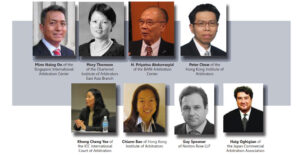 The Philippine Dispute Resolution Center, Inc. (PDRCI), the Philippine Institute of Arbitrators (PIArb), and the Philippine Institute of Construction Arbitrators and Mediators (PICAM) will host a two-day conference on “ADR Best Practices & PPP Opportunities” on November 8 and 9, 2012 at the InterContinental Hotel in Makati City.
The Philippine Dispute Resolution Center, Inc. (PDRCI), the Philippine Institute of Arbitrators (PIArb), and the Philippine Institute of Construction Arbitrators and Mediators (PICAM) will host a two-day conference on “ADR Best Practices & PPP Opportunities” on November 8 and 9, 2012 at the InterContinental Hotel in Makati City.
The conference will highlight global trends and best practices in arbitration and alternative modes of dispute resolution (ADR) as well as feature public-private partnership opportunities (PPP) in the Philippines.
Confirmed international speakers for the event include Minn Naing Oo of the Singapore International Arbitration Center, Mary Thomson of the Chartered Institute of Arbitrators East Asia Branch, H. Priyatna Abdurrasyid of the BANI Arbitration Center, Peter Chow of the Hong Kong Institute of Arbitrators, Khong Cheng Yee of the ICC International Court of Arbitration, Chiann Bao of Hong Kong Institute of Arbitrators, Guy Spooner of Norton Rose LLP, and Haig Oghigian of the Japan Commercial Arbitration Association.
Among the topics to be discussed are: the International Bar Association Guidelines on Disclosure; Dispute Resolution on PPP; Substance, Procedure and Institutions in International Investment Arbitration and International Commercial Arbitration; Recognition and Enforcement of Arbitral Awards – Latest Developments on the Concept of “Public Policy,” Due Process, Arbitrator Discretion and the Treatment of Evidence in Commercial Arbitration; Recent Challenges Faced by Arbitral Institutions; and recent developments in international commercial arbitration.
The conference aims to improve and strengthen the Philippine ADR system by keeping key stakeholders abreast on recent ADR trends and best practices.
The court’s jurisdiction in aid of arbitration
 Fifth, when an arbitrator is challenged before the arbitral tribunal under the procedure agreed upon by the parties or under the procedure provided in Article 13 (2) of the Model Law and the challenge is not successful, the aggrieved party may request the Appointing Authority to rule on the challenge, and when such Appointing Authority fails or refuses to act on the challenge within such period as may be allowed under the applicable rule or in the absence thereof, within 30 days from receipt of the request, that the aggrieved party may renew the challenge in court (SADR, Rule 7.2). After hearing, the court shall remove the challenged arbitrator if it finds merit in the petition; otherwise, it shall dismiss the petition (SADR, Rule 7.7).
Fifth, when an arbitrator is challenged before the arbitral tribunal under the procedure agreed upon by the parties or under the procedure provided in Article 13 (2) of the Model Law and the challenge is not successful, the aggrieved party may request the Appointing Authority to rule on the challenge, and when such Appointing Authority fails or refuses to act on the challenge within such period as may be allowed under the applicable rule or in the absence thereof, within 30 days from receipt of the request, that the aggrieved party may renew the challenge in court (SADR, Rule 7.2). After hearing, the court shall remove the challenged arbitrator if it finds merit in the petition; otherwise, it shall dismiss the petition (SADR, Rule 7.7).
Sixth, any of the parties to an arbitration may request the termination of the mandate of an arbitrator where an arbitrator becomes de jure or de facto unable to perform his function or for other reasons fails to act November 2012 The court’s jurisdiction in aid of arbitration By Arthur P. Autea without undue delay and that arbitrator, upon request of any party, fails or refuses to withdraw from his office (SADR, Rule 8.1). If an arbitrator refuses to withdraw from his office, and subsequently, the Appointing Authority fails or refuses to decide on the termination of the mandate of that arbitrator within such period as may be allowed under the applicable rule or, in the absence thereof, within 30 days from the time the request is brought before him, any party may file with the court a petition to terminate the mandate of that arbitrator (SADR, Rule 8.2). After hearing, if the court finds merit in the petition, it shall terminate the mandate of the arbitrator who refuses to withdraw from his office; otherwise, it shall dismiss the petition (SADR, Rule 8.6).
Seventh, while the arbitral tribunal is granted the power to issue subpoena, it has no power to punish for contempt in the event that the person subject of the subpoena refuses to obey. This may cause a stumbling block in the taking of evidence in arbitration. Thus, any party to an arbitration, whether domestic or foreign, may request the court to provide assistance in taking evidence (SADR, Rule 9.1). The court may grant or execute the request for assistance in taking evidence within its competence and according to the rules of evidence (SADR, Rule 9.4). If the evidence sought is not privileged and is material and relevant, the court shall grant the assistance in taking evidence requested and shall order petitioner to pay costs attendant to such assistance (SADR, Rule 9.8).
Eighth, a party, counsel, or witness who disclosed or who was compelled to disclose information relative to the subject of ADR, under circumstances that would create a reasonable expectation on behalf of the source that the information shall be kept confidential, has the right to prevent such information from being further disclosed without the express written consent of the source or the party who made the disclosure (SADR, Rule 10.1). A party may request a protective order at any time there is a need to enforce the confidentiality of the information obtained, or to be obtained, in ADR proceedings (SADR, Rule 10.2). If the court finds the petition or motion meritorious, it shall issue an order enjoining a person or persons from divulging confidential information (SADR, Rule 10.8).
Ninth, any party to a domestic arbitration may petition the court to confirm, correct, or vacate a domestic arbitral award (SADR, Rule 11.1). Unless a ground to vacate an arbitral award is fully established, the court shall confirm the award (SADR, Rule 11.9).
Tenth, any party to an international commercial arbitration in the Philippines may petition the court to recognize and enforce or set aside an arbitral award (SADR, Rule 12.1). It is presumed that an arbitral award was made and released in due course and is subject to enforcement by the court, unless the adverse party is able to establish a ground for setting aside or not enforcing an arbitral award (SADR, Rule 12.12).
Eleventh, any party to a foreign arbitration may petition the court to recognize and enforce a foreign arbitral award (SADR, Rule 13.1). It is presumed that a foreign arbitral award was made and released in due course of arbitration and is subject to enforcement by the court. The court shall recognize and enforce a foreign arbitral award unless a ground to refuse recognition or enforcement of the foreign arbitral award Rule 13 is fully established (SADR, Rule 13.11).
While the law respects party autonomy in arbitration and other forms of alternative dispute resolution, the power of judicial review remains and it is best expressed in the power of the court to confirm, correct, or modify; vacate, recognize, and enforce; set aside; or to refuse recognition of an arbitral award.
